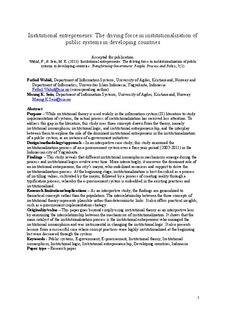Institutional entrepreneurs: The driving force in institutionalization of public systems in developing countries
Journal article, Peer reviewed
Permanent lenke
http://hdl.handle.net/11250/136324Utgivelsesdato
2013Metadata
Vis full innførselSamlinger
Originalversjon
Wahid, F., & Sein, M. K. (2013). Institutional entrepreneurs: The driving force in institutionalization of public systems in developing countries. Transforming Government: People, Process and Policy, 7(1), 76-92. doi: 10.1108/17506161311308179 10.1108/17506161311308179Sammendrag
Purpose: While institutional theory is used widely in the information system (IS) literature to study implementation of systems, the actual process of institutionalization has received less attention. The purpose of this paper is to address this gap in the literature by using three concepts drawn from the theory, namely, institutional isomorphism, institutional logic and institutional entrepreneurship, and the interplay between them to explore the role of the dominant institutional entrepreneur in the institutionalization of a public system, as an instance of e-government initiatives. Design/methodology/approach: In an interpretive case study, this study examined the institutionalization process of an e-procurement system over a four-year period (2007-2011) in the Indonesian city of Yogyakarta. Findings: This study reveals that different institutional isomorphism mechanisms emerge during the process and institutional logics evolve over time. More interestingly, it uncovers the dominant role of an institutional entrepreneur, the city's mayor, who mobilized resources and support to drive the institutionalization process. At the beginning stage, institutionalization is best described as a process of instilling values, cultivated by the mayor, followed by a process of creating reality through a typification process, whereby the e-procurement system is embedded in the existing practices and institutionalized. Research limitations/implications: As an interpretive study, the findings are generalized to theoretical concepts rather than the population. The interrelationship between the three concepts of institutional theory represents plausible rather than deterministic links. It also offers practical insights, such as e-procurement implementation strategy. Originality/value: This paper goes beyond simply using institutional theory as an interpretive lens by examining the interrelationship between the mechanisms of institutionalization. It shows that the main catalyst of the institutionalization process is the institutional entrepreneur who managed the institutional isomorphism and was instrumental in changing the institutional logic. It also presents lessons from a successful case where corrupt practices were highly institutionalized at the beginning but were decreased through the system.
Beskrivelse
Author's version of an article in the journal: Transforming Government: People, Process and Policy. Also available from the publisher at: http://dx.doi.org/10.1108/17506161311308179
Utgiver
EmeraldTidsskrift
Transforming Government: People, Process and PolicyBeslektede innførsler
Viser innførsler beslektet ved tittel, forfatter og emneord.
-
From NGOs to Banks: Does Institutional Transformation Alter the Business Model of Microfinance Institutions?
D'Espallier, Bert; Goedecke, Jann; Hudon, Marek; Mersland, Roy (Peer reviewed; Journal article, 2016) -
An ethical perspective on problems multinational companies in the apparel industry face, when outsourcing their production to developing countries with inadquate institutions
Thormodsen, Håkon Skilhagen (Master thesis, 2014)This thesis addresses the ethical problems multinational companies in the apparel industry face, when outsourcing their production to developing countries with inadequate institutions. I will use ... -
Ethical perspective on problems faced by companies in natural resource industries operating in countries with inadequate institutions
Lian, Øyvind (Master thesis, 2009)This thesis looks at the ethical problems and difficulties that arise when large multinational corporations do business in countries suffering from corruption, poverty, and hunger. The countries in question are rich in ...
